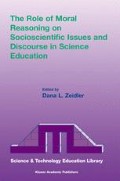Access this chapter
Tax calculation will be finalised at checkout
Purchases are for personal use only
Preview
Unable to display preview. Download preview PDF.
References
Abd-El-Khalick, F., Bell, R. L., & Lederman, N.G. (1998). The nature of science and instructional practice: Making the unnatural natural. Science Education, 82, 417–436.
American Association for the Advancement of Science. (1989). Project 2061: Science for all Americans. Washington, DC: Author.
American Association for the Advancement of Science. (1993). Benchmarks for science literacy: A Project 2061 report. New York: Oxford University Press.
Bell, R. L. (1999). Understandings of the nature of science and decision making on science and technology based issues (Doctoral dissertation, Oregon State University, 1999). Dissertation Abstract International, 60, 3310.
Bell, R. L. (in press). Perusing Pandora’s Box: Exploring the what, when, and how of nature of science instruction. In L. Flick & N. Lederman (Eds.), Scientific inquiry and nature of science: Implications for teaching, learning, and teacher education. The Netherlands: Kluwer Academic Publishers.
Bell, R. L., Lederman, N. G., & Abd-El-Khalick, F. (2000). Developing and acting upon one’s conception of the nature of science: A follow-up study. Journal of Research in Science Teaching, 37, 563–581.
Brinckerhoff, R. F. (1992). One-minute readings: Issues in science, technology, and society. New York, NY: Addison-Wesley.
Campbell, V., Lofstrom, J., & Jerome, B. (1997). Decisions based on science. Arlington, VA: National Science Teachers Association.
Carey, S., & Smith, C. (1993). On understanding the nature of scientific knowledge. Educational Psychologist, 28, 235–251.
Collins, H. M. & Pinch, T. (1998) The golem: What you should know about science. (2nd ed.). Cambridge, MA: Cambridge University Press.
Collins, H. M., & Shapin, S. (1986, June 27). Uncovering the nature of science. Times Higher Educational Supplement. Reprinted in J. Brown, A. Cooper, T. Horton, F. Toates, & D. Zeldin (Eds.) (1986) Science in schools, (p. 71–77). Milton Keynes: Open University Press.
Cotham, J., & Smith, E. (1981). Development and validation of the conceptions of scientific theories test. Journal of Research in Science Teaching, 18(5), 387–396.
Davidson, P., Turiel, E., & Black, A. (1983). The effect of stimulus familiarity on the use of criteria and justification in children’s social reasoning. British Journal of Developmental Psychology, 1, 49–65.
Dibbs, D. R. (1982). An investigation into the nature and consequences of teacher’s implicit philosophies of science. Unpublished dissertation. University of Aston, England.
Driver, R., Leach, J., Millar, R., & Scott, P. (1996). Young people’s images of science. Philadelphia: Open University Press.
Fleming, R. (1986a). Adolescent reasoning in socio-scientific issues, Part I: Social cognition. Journal of Research in Science Teaching, 23, 677–687.
Fleming, R. (1986b). Adolescent reasoning in socio-scientific issues, Part II: Nonsocial cognition. Journal of Research in Science Teaching, 23, 689–698.
Hodson, D. (1994). Seeking directions for change: The personalisation and politicisation of science education. Curriculum Studies, 2, 71–98.
Iozzi, L. (1978). The environmental issues test (EIT): A new assessment instrument for environmental education. In C. Davis and A. Sacks (Eds.), Current issues in environmental education-IV. Columbus, OH: ERIC Clearinghouse for Science, Mathematics, and Environmental Education, 1978, 200–206.
Kuhn, D., Amsel, E., & O’Loughlin, M. (1989). The development of scientific thinking skills. New York: Academic Press.
Kuhn, T. S. (1996). The structure of scientific revolutions. 3rd Edition. Chicago: The University of Chicago Press.
Lederman, N. G. (1983). Delineating classroom variables related to students’ conceptions of the nature of science. (Doctoral dissertation, Syracuse University, 1983). Dissertation Abstracts International, 5-02A, 0483.
Lederman, N. G. (1992). Students’ and teachers’ conceptions of the nature of science: A review of the research. Journal of Research in Science Teaching, 29, 331–359.
Lederman, N. G. (1999). Teachers’ understandings of the nature of science and classroom practice: Factors that facilitate or impede the relationship. Journal of Research in Science Teaching, 36, 916–929.
Lederman, N. G., Abd-El-Khalick, F., Bell, R. L., & Schwartz, R. S. (2002). Views of nature of science questionnaire (VNOS): Toward valid and meaningful assessment of learners’ conceptions of nature of science. Journal of Research in Science Teaching, 39, 497–521.
Lederman, N., & O’Malley, M. (1990). Students’ perception of tentativeness in science: Development, use, and sources of change. Science Education, 74(2), 225–239.
Lederman, N. G., & Zeidler, D. L. (1987). Science teachers’ conceptions of the nature of science: Do they really influence teaching behavior? Science Education, 71, 721–734.
McComas, W. F., Clough, M.P., & Almazroa, H. (1998). The role and character of the nature of science in science education. In W. McComas (Ed.), The nature of science in science education: Rationales and strategies (p. 3–39). The Netherlands: Kluwer Academic Publishers.
Mellado, V. (1997). Preservice teachers’ classroom practice and their conceptions of the nature of science. Science & Education, 6, 331–354.
Millar, R. & Wynne, B. (1988). Public understanding of science: From contents to processes. International Journal of Science Education, 10(4), 388–98.
National Research Council. (1996). National science education standards. Washington, DC: National Academic Press.
Pedretti, E. & Hodson, D. (1995). From rhetoric to action: Implementing STS education through action research. Journal of Research in Science Teaching, 32, 463–485.
Piaget, J. (1972). Intellectual evolution from adolescence to adulthood. Human Development, 15, 1–12.
Popper, K. R. (1988). The open universe: An argument for indeterminism. London: Routledge.
Shamos, M. (1995). The myth of scientific literacy. New Brunswick, NJ, Rutgers university Press.
Smith, M.U., Lederman, N.G., Bell, R.L., McComas, W.F., & Clough, M.P. (1997). How great is the disagreement about the nature of science? A response to Alters. Journal of Research in Science Teaching, 34,1101–1103.
Author information
Authors and Affiliations
Editor information
Editors and Affiliations
Rights and permissions
Copyright information
© 2003 Kluwer Academic Publishers
About this chapter
Cite this chapter
Bell, R.L. (2003). Exploring the Role of Nature of Science Understandings in Decision-Making. In: Zeidler, D.L. (eds) The Role of Moral Reasoning on Socioscientific Issues and Discourse in Science Education. Science & Technology Education Library, vol 19. Springer, Dordrecht. https://doi.org/10.1007/1-4020-4996-X_4
Download citation
DOI: https://doi.org/10.1007/1-4020-4996-X_4
Publisher Name: Springer, Dordrecht
Print ISBN: 978-1-4020-3855-6
Online ISBN: 978-1-4020-4996-5
eBook Packages: Springer Book Archive

